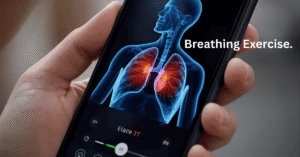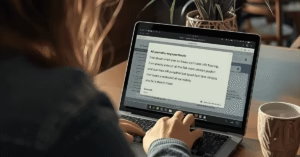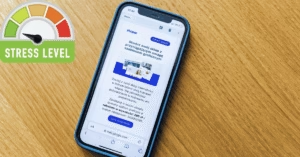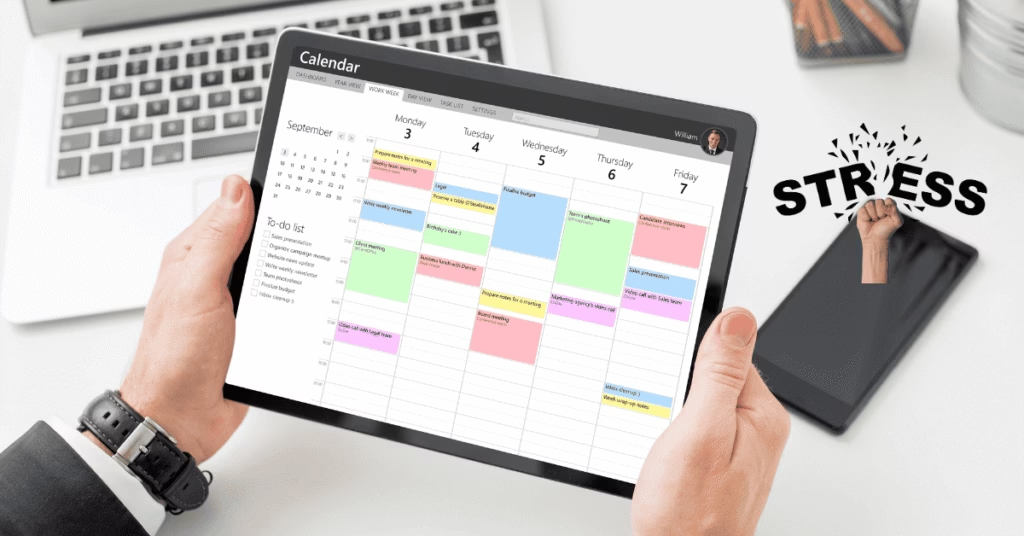Table of Contents
Introduction
Stress is inherent in the modern way of living — close deadlines, continuous notifications, disturbed sleep, and the need to keep pace. But recent AI technologies bring stress management closer and more instant than ever. AI for Stress Management, micro-meditation and journaling prompts to wearable-activated reminders, AI can aid daily tranquility by providing personalized, timely, and handy methods when needed most.
This post gives actionable ways to use AI for stress management that are simple to try today, backed by current research and real product approaches. You’ll learn how AI complements traditional care (not replaces it), how to protect your privacy, the best types of AI tools for different needs.
Why use AI for stress management?
AI is not magic , it’s convenient. It has three significant benefits for stress assistance:
- Immediate availability. AI applications and chatbots are present 24/7 for instant breathing exercises, grounding tips, or journaling when human assistance is not available. That readiness can decrease temporary distress and short-circuit escalation.
- Personalization at scale.Through patterns in your input (and sometimes wearables), AI adjusts prompts, reminders, and content for what works for you. Adaptive breath pacing or contextual journaling is more engaging than static content.. PMC
- Measurable, low-cost support. Trials and reviews demonstrate that AI-powered CBT chatbots and app-based mindfulness programs can deliver significant reductions in anxiety and stress markers, making them an excellent adjunct to therapy. PMC+1
Important:AI is a supplement, not a replacement, for professional licensed mental health care. If you are experiencing severe depression, suicidal ideation, or trauma symptoms, see a human clinician ASAP.
Practical ways to use AI for stress Management
Here are tried-and-tested, easy methods to incorporate AI in your stress kit.
1) Micromeditations & AI-guided breathing (best for immediate relief)
Brief guided breathing or 1–5 minute meditations can reduce acute tension and assist in re-centering. AI apps learn your answers and suggest tailored micro-sessions (duration, length, or voice tone) that suit your schedule. Research on app-delivered mindfulness demonstrates subjective stress and physiological indices such as cortisol and blood pressure improvements in brief programs.. PMC+1. Available in PMC: 2025 Aug 8 Smartphone-based meditation training
How to use: Take a micro-break reminder (15–60 seconds) following a lengthy meeting or in case of heartbeat surge (if your wearable allows). Attempt a 3-minute breath cycle: breathe in 4, hold 4, breathe out 6 — repeat three times.

2) AI journaling and reflective prompts (Best for AI Stress Management)
Contextual AI journaling programs write prompts specifically based on your recent journal entries, sleep, or activity patterns. Studies have found contextual AI journaling to boost positive affect and decrease anxiety by prompting users toward reflection and action. MindScape and other trials report positive mood gain, self-reflection, and decreased negative affect after weeks of tailored journaling. arXiv+1. Large Language Models (LLMs)
How to use: Write in a journal 5–10 minutes every night with an AI that transforms prompts. Search for suggestions such as “What little thing can make tomorrow less difficult?” and a second prompt to plan that action.

3) Mood tracking + wearable integration (best for AI Stress Management)
Wearables (HRV, EDA, sleep trackers) with AI models can identify increasing stress and initiate appropriate interventions — a breathing reminder, a soothing audio cue, or a prompt to get some fresh air. Reams of reviews and recent publications demonstrate wearables accurately identify stress patterns and, when coupled with interventions, can enhance timely assistance. Frontiers PMC
How to use: Hook a reliable wearable up with an AI coach or app. Permit short, actionable reminders (not incessant alarms) and try out what intervention works best for you (walk, breathe, music).

4) AI-curated environment (music, soundscapes, light suggestions)
AI can curate a playlist or ambient soundscapes suited to your mood and task requirements, usually better than static playlists since they learn in real time based on feedback. Adaptive audio has been found to enhance relaxation and concentration when paired with physiological or self-report indicators. mhealth.jmir
How to use: Listen to music through an app that adjusts sound for relaxation or concentration; couple with a brief breathing exercise.
5) Digital micro-breaks at work (best for preventing burnout)
Artificial intelligence applications that calculate calendar density, typing cadence, and meeting volume can suggest brief breaks to “refill” your mental energy levels before reaching overload. Micro-breaks throughout the day are associated with better mood and less stress in workplace studies. ahead-app.com. Time
How to use: Establish rules for AI (e.g., “If 90 minutes of focused work → 2-minute breath break”) and make breaks short and device-free if possible.
Safety & privacy checklist
When picking AI tools, prioritize safety:
- Privacy policy: Select apps that openly declare they don’t sell personal data and have a deletion feature.
- Security: Expect industry-standard encryption and secure storage.
- Crisis support: Tools must have clear instructions/movie-buttons for accessing human assistance or emergency services.
- Transparency: Favor suppliers that make publication of research or validation studies available. Current reviews highlight promise and danger: AI can assist low-risk emotional needs but is not yet regulated and can break down at key points.
- Prevention. The Washington. PostPrevention
Real user snapshot
Ayesha’s experience:Ayesha’s experience: A mid-career manager employed an AI app that prescribed a 5-minute “overnight calm” routine and evening reflective journaling. Within three weeks, she experienced quicker sleep onset, fewer midnight wake-ups, and reduced daytime anxiety. The pairing of brief, AI-scheduled breathing sessions with contextual journaling enabled her to identify patterns of stress (working too hard before bed) and adjust some habits: no screens 30 minutes prior to sleep and a 3-minute breathing ritual every night.
FAQs
Q: Can AI replace therapy?
No. AI can augment therapy — for daily check-ins, skill practice, and early intervention — but not replace licensed mental health professionals, particularly for serious conditions. PMC
Q: Are AI tools proven to reduce stress?
Yes—there is evidence that app-based mindfulness interventions and AI-assisted CBT chatbots decrease anxiety and enhance well-being in trials, although effect sizes and study quality are variable. PMC JMIR
Q: Will wearables misread stress?
Wearables are not perfect but are getting better. They measure physiological surrogates (HRV, EDA) which are associated with stress; models are improved by adding context (sleep, activity).
Q: How long before I see benefits?
Some users experience relief instantaneously after micro-sessions; quantifiable changes in sleep or mood tend to become apparent within 2–6 weeks of continued use in trials.
Action plan — 7-day starter routine
- Day 1: Download one trusted AI stress app (look for published validation).
- Day 2: Set a daily 3-minute micro-meditation reminder.
- Day 3: Begin 5-minute nightly AI journaling.
- Day 4: If you have a wearable, enable one stress-detection alert.
- Day 5: Let the AI recommend a calming playlist and use it during a 10-minute break.
- Day 6: Review your app’s insights (patterns) and pick one habit to change.
- Day 7: Reflect: note what improved (sleep, mood, focus) and adjust.
1. Comparison Table of AI Stress Management Apps
| AI App / Coach | Best For | Key Features | Pricing | Specification |
|---|---|---|---|---|
| Wysa | CBT-based journaling & mood support | AI chatbot, CBT, guided journaling, empathy-driven chat | Freemium (Pro plan adds therapist support) | Wysa AI mental health chatbot for stress management |
| Woebot | Daily CBT check-ins | Conversational AI, mood tracking, skill practice | Freemium | Woebot AI therapy chatbot reducing anxiety |
| Headspace + Ebb (AI) | Personalized meditation & mindfulness | AI-powered meditation suggestions, sleep stories, stress relief | Subscription | Headspace meditation app AI-guided stress relief |
| Noah | Emotional AI support | Mood check-ins, journaling, customizable self-care | Freemium | Noah AI mental health coach app supporting stress relief |
| Driven App | Resilience & daily routines | Micro-assessments, resilience training, AI wellness coach | Paid plans | Driven AI resilience app building stress resistance |
| Eve Coach | Work-related stress | Personalized coping strategies, balance planning, burnout prevention | Subscription | Eve AI stress coach app for workplace wellness |
| Endel | Relaxation & focus via adaptive music | Generative soundscapes tuned to mood, time, HR | Subscription | Endel AI music |
Conclusion
AI is no panacea, but it is a mighty ally for coping with stress in this hectic new world. From pace-setting breathing and dynamic journaling to mood monitoring and customized soundscapes, AI applications provide us with instant, personalized help at our fingertips. They can help ease the tension of the everyday, develop hardiness, and promote good habits — all while stressing simplicity and affordability.
Nevertheless, it’s critical to regard AI as a complement, and not replacement, for human support. For moderate to severe stress, they can be life-altering. For more profound challenges, licensed experts are still crucial.
If you’re ready to take control of your stress, try one AI-powered app this week — whether it’s Wysa, Woebot, Headspace, or Endel. Start small with a three-minute breathing session or a daily journal prompt, and you’ll likely notice improvements within weeks.
Your turn: download an AI stress app, try it for 7 days, and observe how your mood and concentration improve. Calm, clarity, and resilience are nearer than you believe.





